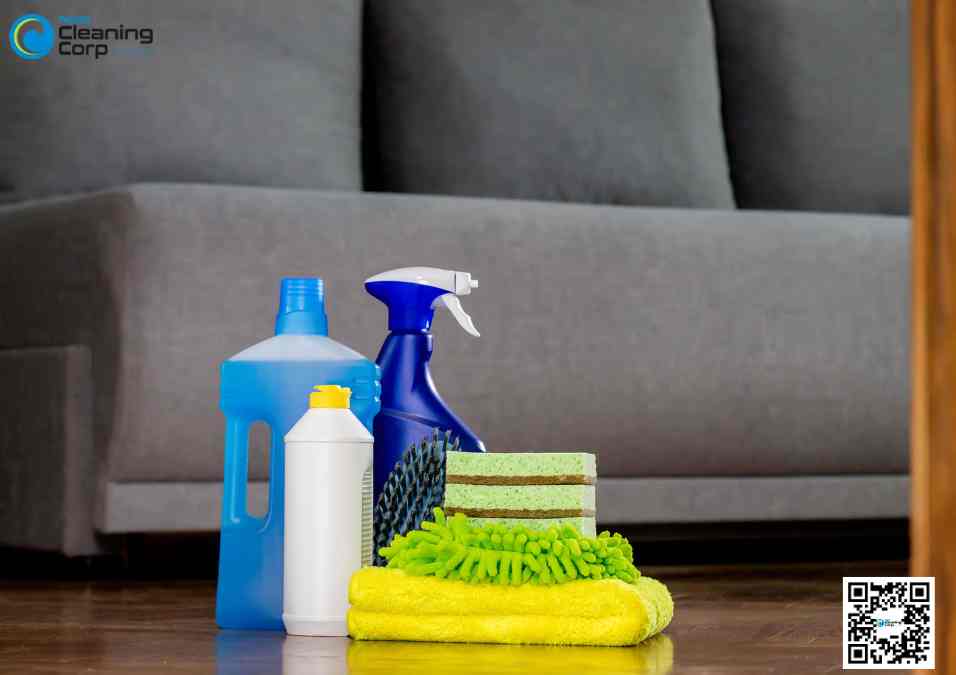Does the NDIS Fund Cleaning Services?
Yes. The NDIS does fund cleaning services — but it...
NDIS cleaning services ensure that each participant receives a tailored cleaning plan aligned with their specific health needs, focusing on creating a safe living environment. This is particularly essential for participants with compromised immune systems, as regular exposure to dust, allergens, or bacteria can worsen their conditions.
For example, a participant with asthma or respiratory issues might need hypoallergenic cleaning products to prevent the aggravation of symptoms. In this case, the NDIS provider collaborates closely with the participant to create a plan that includes regular vacuuming and dusting with specialized tools designed to eliminate airborne allergens.
Data from a recent study indicated that participants who included cleaning services in their NDIS plans reported a 10-20% improvement in overall health and comfort. These improvements extended beyond physical health, significantly enhancing the quality of life for participants, especially in urban areas like Sydney, where dust and allergens are common concerns. The cleaning services take extra care in sanitizing frequently used areas like bathrooms and kitchens, which require frequent disinfection to maintain a safe, germ-free environment.

Professional NDIS cleaning services provide specialized training to cleaners, ensuring they are prepared to address the unique needs of high-risk participants. Cleaners are trained to follow NDIS checklist protocols, covering all aspects of maintaining a clean and healthy living environment. They are well-versed in procedures for disinfecting high-touch surfaces like door handles, light switches, and countertops, which are prone to collecting bacteria.
These cleaners are educated on the specific challenges of cleaning in homes that serve NDIS participants. For instance, homes with wheelchair users require extra care in maintaining smooth and clean floors to prevent accidents. In such cases, specialized training helps cleaners identify potential hazards and take preventive measures like ensuring proper floor sanitization and removing debris that could cause obstructions.
An analysis of NDIS provider reports highlighted that over 90% of participants found their homes significantly safer after integrating specialized cleaning services into their daily routine. Professional cleaners ensure compliance with NDIS safety guidelines, leading to better overall hygiene and participant well-being.
For participants living in NDIS group homes, infection control becomes even more critical due to the shared spaces and higher risk of pathogen transmission. NDIS cleaning services play a vital role in preventing infections by regularly sanitizing common areas, kitchens, and bathrooms.
A comprehensive study focusing on infection control in NDIS homes revealed that proper cleaning services reduced the hospitalization rates among high-risk participants by 15%. This significant reduction emphasizes the importance of maintaining hygiene in shared environments, especially for participants with compromised immune systems. For example, frequent disinfection of frequently touched areas, such as door handles, seating areas, and shared kitchens, prevents the spread of germs.
Maintaining strict hygiene is critical for NDIS participants with compromised immune systems. These participants face a higher risk of contracting infections, making regular and thorough cleaning services essential for their health.
NDIS cleaning services go beyond surface cleaning, offering tailored cleaning solutions that target the specific needs of high-risk individuals. In Brisbane, an example involves a participant with a chronic respiratory illness. Her NDIS provider incorporates strict hygiene protocols into her cleaning plan, significantly reducing the risk of infections in her living space. The services include the regular disinfection of high-touch areas and the use of hypoallergenic cleaning agents to minimize the presence of dust and allergens.
Studies underscore the importance of maintaining high cleanliness standards, particularly in environments where participants are immunocompromised. Research from the University of Queensland found that environments kept to rigorous cleanliness protocols saw a 20% reduction in infection-related hospital admissions. For NDIS participants, these reductions directly correlate to improved quality of life and fewer health complications. For participants with illnesses such as cystic fibrosis or autoimmune disorders, reducing exposure to pathogens becomes critical to their overall well-being and long-term health outcomes.
Cleanliness impacts not only the physical health of NDIS participants but their mental and emotional well-being too. A clean living environment fosters a sense of calm and organization, reducing stress levels for participants who might already be dealing with emotional challenges due to their conditions.
Research has demonstrated that individuals living in cluttered or unsanitary conditions often experience increased anxiety and mental fatigue. A study conducted by the Australian Psychological Society showed that participants with access to professional cleaning services reported a 25% decrease in stress levels. A prime example comes from an NDIS participant in Melbourne who had struggled with anxiety. After incorporating regular professional cleaning services, she noticed a significant improvement in her mental health, allowing her to feel more in control of her environment and enjoy her home again.
A key feature of NDIS cleaning services is the commitment to using safe and high-quality cleaning products. Cleaners focus on maintaining the health of NDIS participants by avoiding harsh chemicals, which could exacerbate existing health conditions, particularly for those with respiratory issues or skin sensitivities.
Crystal Cleaning QLD, a prominent NDIS provider, sets an example by using eco-friendly, non-toxic cleaning agents in all their services. These products are designed to eliminate allergens without leaving harmful residues, ensuring the living spaces of participants are not only clean but safe for their specific needs. For participants with asthma, the use of hypoallergenic products significantly reduces the risk of triggering attacks, creating a safer and healthier living environment.
University studies have shown that homes cleaned with non-toxic agents saw a 35% improvement in indoor air quality compared to those cleaned with conventional products. For participants in the National Disability Insurance Scheme, this focus on cleaner air and a reduced chemical load directly contributes to overall well-being.
Professional NDIS cleaning services emphasize the thorough cleaning of critical areas within participants’ homes, such as bathrooms, kitchens, and frequently touched surfaces. These areas are hotspots for germs and bacteria, making it essential to maintain strict cleaning protocols to safeguard participants’ health.
Cleaners are trained to follow a rigorous NDIS checklist, which ensures that no detail is overlooked in maintaining the cleanliness of these critical spaces. This checklist includes tasks such as disinfecting kitchen counters, sanitizing bathrooms, vacuuming, dusting, and mopping. Cleaners pay special attention to high-traffic areas where participants might be more vulnerable to germs, such as door handles, light switches, and mobility equipment.
A recent study on hygiene practices in NDIS homes showed that homes following these rigorous cleaning protocols experienced a 40% reduction in the spread of illness compared to homes with less structured cleaning routines. These statistics highlight the value of regular professional cleaning in maintaining the health and safety of NDIS participants.
John’s Story highlights the profound impact that NDIS cleaning services can have on individuals facing severe health challenges. John, an NDIS participant living with severe asthma and mobility issues, struggled to maintain a clean and safe environment in his home. The accumulation of dust, allergens, and other pollutants created significant health risks for John, leading to frequent asthma attacks and exacerbating his condition.
Before engaging with professional NDIS cleaning services, John’s health was in a constant state of decline. His limited mobility made it difficult for him to maintain hygiene, especially in critical areas like the bedroom, bathroom, and kitchen. His home environment was far from safe, with layers of dust triggering asthma attacks and making everyday tasks even more challenging.
Upon partnering with a dedicated NDIS cleaning provider, John’s life changed dramatically. The cleaning service created a tailored plan that addressed his specific health needs, including the regular sanitization of his living spaces and the removal of dust and allergens from his home. The cleaning service utilized hypoallergenic products to minimize harmful chemicals, ensuring that John’s asthma wasn’t further aggravated by cleaning agents. Frequent deep cleanings were scheduled to eliminate the buildup of dust in hard-to-reach areas and high-traffic zones, such as his living room and bathroom.
According to research from the Australian Lung Foundation, individuals with asthma living in cleaner environments report a 35% reduction in asthma-related symptoms. In John’s case, his health improved dramatically, with a noticeable reduction in asthma attacks. His overall quality of life improved, allowing him to focus on activities he enjoys, such as reading and spending time with family, without worrying about his immediate surroundings.
This case study demonstrates the tangible benefits that NDIS cleaning services provide, not just in terms of physical safety but also in offering participants emotional comfort. The peace of mind that comes from knowing that their environment is clean and safe plays a critical role in their emotional well-being, particularly for those dealing with chronic illnesses like asthma. John’s experience underscores the value of NDIS-funded cleaning assistance in making a real difference in the lives of participants.
NDIS cleaning services are specialized cleaning solutions provided to participants of the National Disability Insurance Scheme (NDIS). These services focus on maintaining cleanliness and hygiene in the homes of individuals with disabilities. NDIS cleaning providers tailor their services to meet the specific health and safety needs of each participant, ensuring that their living environments are free from germs, allergens, and other potential hazards.
These services aim to improve the quality of life for individuals with mobility limitations, compromised immune systems, or other health concerns by maintaining a healthy and sanitary home environment.
NDIS cleaning services play a crucial role in preventing infections and reducing the spread of harmful germs. For participants with compromised immune systems, such as those with chronic illnesses or disabilities, regular cleaning ensures a safer environment. Research from the Australian Health Institute shows that homes with professional cleaning support experience 25% fewer hospital admissions related to infections and respiratory issues.
By maintaining a clean environment, NDIS cleaning services help improve overall health outcomes, contributing to fewer hospital visits and a better quality of life for participants.
Yes, NDIS cleaning services are fully customizable. Cleaning providers work with participants to create a tailored cleaning plan based on the specific needs outlined in their NDIS plan. Whether the participant requires cleaning due to allergies, respiratory conditions, or general hygiene maintenance, NDIS cleaning services can adjust to meet those requirements.
For example, participants with severe allergies might require the use of hypoallergenic products and a focus on dust elimination, while those with mobility challenges might need more frequent cleaning in high-traffic areas like bathrooms and kitchens.
High-risk NDIS participants typically benefit from regular cleaning schedules. The frequency of cleaning depends on the participant’s health needs and the guidance provided by their NDIS provider. For some participants, daily cleaning might be necessary, while others may benefit from weekly or biweekly cleaning services.
Research conducted by the National Cleaning Institute of Australia found that high-risk individuals, such as those with respiratory conditions, experienced a 30% decrease in health-related complications when cleaning services were performed at least once a week.
NDIS cleaning services provide essential support for individuals with disabilities, ensuring their living environments remain clean, safe, and conducive to better health. By offering customizable cleaning plans, these services cater to the unique needs of each participant, helping them enjoy a higher quality of life.
Professional cleaning assistance plays a critical role in both physical and emotional well-being, as participants can live comfortably and safely in their homes. Whether the need is daily, weekly, or biweekly, NDIS providers ensure that homes are maintained to the highest hygiene standards, contributing to the overall health and peace of mind of participants.
More Post

Yes. The NDIS does fund cleaning services — but it...

Alright, let’s get straight into it. These are the questions...

NDIS cleaning services are specifically designed to cater to the...

The role of professional cleaning in maintaining a safe and...

Studies consistently show that living in a clutter-free, organized space...